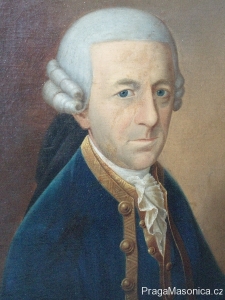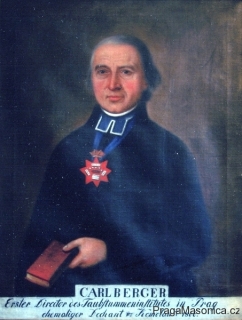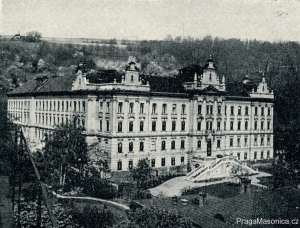An old Masonic charity:
The School for Deaf Mute in Prague
The School for children with hearing disabilities in Prague is the oldest institution of this kind in the Czech Republic, and also the largest and most advanced one today. Due to its role model, it reports directly to the Ministry of Education. The day-school has currently 125 children between the age of 3 and 20.There is a kindergarten, lower and middle school. They can follow up their education by learning a profession such as carpenter, cook, upholsterer, tinsmith, locksmith, seamster and others. For children from outside Prague there is a boarding section with currently 75 pupils. The children are taken care-off by a very professional staff of 80 teachers.
It is also a very old institute. It was founded in 1786 that is 225 years ago and was, until WWII, the only one of its kind in the whole country. It is not widely known, however, that it was founded, managed and financed for the first seven years, by freemasons. The initiative was taken by Casper Herman Count Kunigl, worshipful master of lodge At the Nine Stars in Prague. His father was Sebastian Count Kunigl, and active in the first lodges in Bohemia: in Three crowned Stars in Prague and Sincerity in Leitmeritz. Casper Herman, who continued his father’s Masonic work, was also member of the Three crowned Stars lodge in Prague, and later founded the lodge At the nine Stars. Bro Casper was very active in the field of charity. He was the driving force in the establishment of the first Prague orphanage. It was founded in 1773, was the pride of all Prague masons for very many years, and survived as a private institute till the end of WWII. Empress Maria Theresa, donated a palace to the orphanage, where the lodges also met. Also her successors, Emperors Joseph II and Leopold II visited and financially supported this institute. The late 18th century was the golden age of Prague masonry: more then 600 freemasons were active, which would have been about 1% of the population at the time. In addition to charitable institutions, the masons were the driving forces at the roots of important institutions like for example the National Museum, Academy of Sciences and National Gallery.
On 16 September 1786, Bro Casper Count Kunigl visited Emperor Joseph II, who was near Prague at the time, on army exercises, and proposed and asked permission to establish another orphanage. The Emperor suggested, however, to start a school for deaf mute. He has seen the first such school in Paris and later in Leipzig, Rome and Vienna, so Prague became the
fifth place in the world to establish a deaf mute school. The school started with seven pupils. Bro Count Kunigl and his fellow lodge members like Sweerts-Spork, Motted, Zedliz, Wirsing and Wahr, (the last was director of the national theater in Prague where Mozart’s Don Giovanni was performed for the first time), financed the school from their own pockets for more than seven years. Bro Kunigl was also instrumental in hiring the first head master Karl Berger. He was an outstanding leader, a pioneer of deaf mute education in Bohemia and the soul of the school for the first ten years. He is listed in the records as a member of the lodge Truth and Unity in Prague in 1792.Bro Philip Count Sweerts Spork took over the directorship of the school after Count Kunigl. He strengthened the financial basis of the school by establishing a Trust, supported by all Prague lodges. This Trust also financed the Orphanage, and helped the widows and orphans of deceased masons.
Unfortunately, in 1795, Emperor Francis II, closed all lodges and Masonic activities. However, the charitable institutions were allowed to continue, not as Masonic but as private institutions.
The Deaf Mute school has continued to function until the present day.
In 1936, the 150th anniversary of the school was celebrated with guests from many countries. The Ladies Jubilee Committee was chaired by the wife of the President of the Republic, Bro Edward Benes, aided by committee members including the wife of
the Grand Master Karel Weigner (who was Chancellor of the Charles University), as well as the wives of other well-known masons like Syllaba, Scheiner and Gregr. Since 1948, the school has been funded by the state.Some years ago, members of Lodge Most, later followed by other lodges established contact with the school. In spite of being a state funded school, there is always a shortage of means in nearly every imaginable area. Obviously, the days when a lodge could finance the running of the whole school are gone, so the material and financial support by lodges today is more modest.
Moreover, when the Masonic boarding school Louisa State (in Holland) was closing down some time ago, brethren from Prague and Holland joined forces to arrange for much of the equipment to be transported to Prague and given to this school, to improve its Boarding section. Grand East of the Netherlands supported this Masonic cross border help.
In 1986, still under communism, the School celebrated its 200th anniversary and a booklet was published to commemorate this occasion. It is quite remarkable, that the Masonic roots of the school were honorably mentioned.
Now, after 225 years the school remains the leading institution in the Czech republic in the education of deaf mute children. It is thus more than successfully fulfilling its mission given so long ago by a small group of Prague Freemasons.
© Jacob Sadilek



